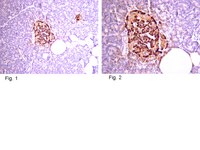Human oocytes reprogram adult somatic nuclei of a type 1 diabetic to diploid pluripotent stem cells.
Yamada, Mitsutoshi, et al.
Nature, (2014)
2014
Kivonat megmutatása
The transfer of somatic cell nuclei into oocytes can give rise to pluripotent stem cells that are consistently equivalent to embryonic stem cells, holding promise for autologous cell replacement therapy. Although methods to induce pluripotent stem cells from somatic cells by transcription factors are widely used in basic research, numerous differences between induced pluripotent stem cells and embryonic stem cells have been reported, potentially affecting their clinical use. Because of the therapeutic potential of diploid embryonic stem-cell lines derived from adult cells of diseased human subjects, we have systematically investigated the parameters affecting efficiency of blastocyst development and stem-cell derivation. Here we show that improvements to the oocyte activation protocol, including the use of both kinase and translation inhibitors, and cell culture in the presence of histone deacetylase inhibitors, promote development to the blastocyst stage. Developmental efficiency varied between oocyte donors, and was inversely related to the number of days of hormonal stimulation required for oocyte maturation, whereas the daily dose of gonadotropin or the total number of metaphase II oocytes retrieved did not affect developmental outcome. Because the use of concentrated Sendai virus for cell fusion induced an increase in intracellular calcium concentration, causing premature oocyte activation, we used diluted Sendai virus in calcium-free medium. Using this modified nuclear transfer protocol, we derived diploid pluripotent stem-cell lines from somatic cells of a newborn and, for the first time, an adult, a female with type 1 diabetes. | 24776804
 |
iPSC-derived β cells model diabetes due to glucokinase deficiency.
Hua, H; Shang, L; Martinez, H; Freeby, M; Gallagher, MP; Ludwig, T; Deng, L; Greenberg, E; Leduc, C; Chung, WK; Goland, R; Leibel, RL; Egli, D
The Journal of clinical investigation
123
3146-53
2013
Kivonat megmutatása
Diabetes is a disorder characterized by loss of β cell mass and/or β cell function, leading to deficiency of insulin relative to metabolic need. To determine whether stem cell-derived β cells recapitulate molecular-physiological phenotypes of a diabetic subject, we generated induced pluripotent stem cells (iPSCs) from subjects with maturity-onset diabetes of the young type 2 (MODY2), which is characterized by heterozygous loss of function of the gene encoding glucokinase (GCK). These stem cells differentiated into β cells with efficiency comparable to that of controls and expressed markers of mature β cells, including urocortin-3 and zinc transporter 8, upon transplantation into mice. While insulin secretion in response to arginine or other secretagogues was identical to that in cells from healthy controls, GCK mutant β cells required higher glucose levels to stimulate insulin secretion. Importantly, this glucose-specific phenotype was fully reverted upon gene sequence correction by homologous recombination. Our results demonstrate that iPSC-derived β cells reflect β cell-autonomous phenotypes of MODY2 subjects, providing a platform for mechanistic analysis of specific genotypes on β cell function. | 23778137
 |









